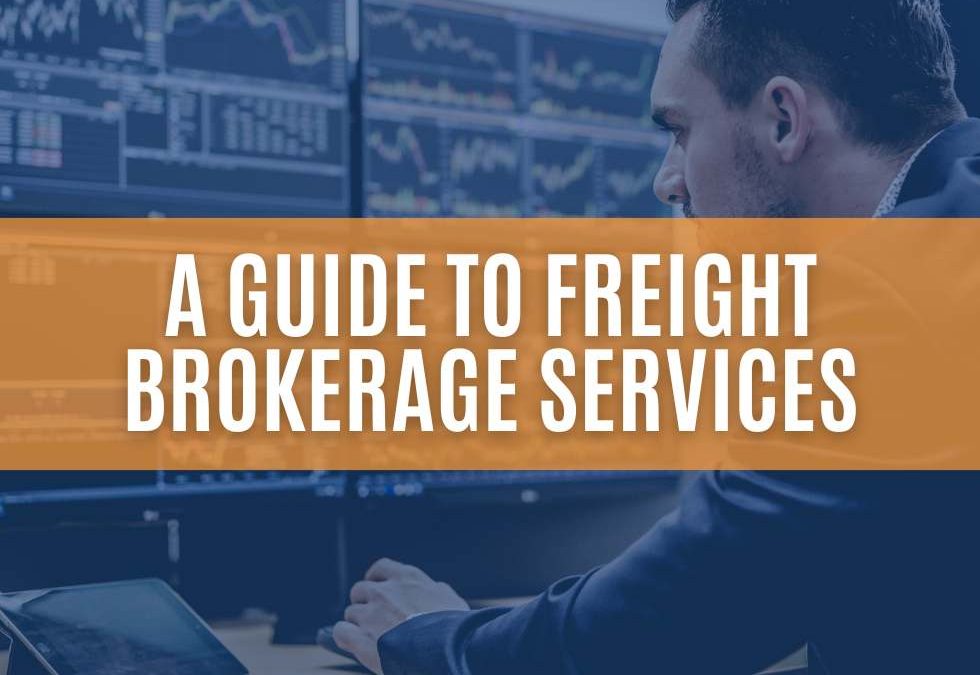For more than 45 years, Kopf Logistics Group has been a pioneer in the trucking logistics sector. With the addition of our brokerage division in 2011, we’ve seen growth in the market driven in large part by the e-commerce market. Freight brokerage services continue to rise, but there is still confusion around the role of a brokerage and the services we provide.
So in this article, we’ll explain the wide range of freight brokerage services available to Shippers and Carriers, and how brokerages utilize Freight Agents to manage logistics operations from start to finish.
Whether you’re a Shipper exploring options, a Carrier seeking reliable partnerships, or a Freight Agent interested in working under the authority of a brokerage, this guide breaks down freight brokerage service offerings and highlights why freight brokerage solutions are vital in today’s supply chain.
What Are Freight Brokerage Services?
Freight Brokers play a crucial role in logistics by acting as intermediaries between Shippers and Carriers. Their main function is to connect companies that need to transport goods with reliable transportation providers.
Many brokerages, like Kopf, perform these services through Freight Agents, who work under the brokerage’s operating authority. Oftentimes these roles are mixed (read more about the differences here).
Shippers typically outsource their logistics to Brokers (through Freight Agents) because they save time by leveraging the Broker’s expertise, networks, and negotiating power.
Brokers handle the complex tasks of:
- Finding and securing reliable Carriers
- Managing shipments from pickup to final delivery
- Resolving problems that arise in transit with Carriers
- Ensuring that delivery schedules are met
We’ll dive into the specifics a little bit later. But first, let’s take a look at why these services even matter.
Why Should Shippers Use Freight Broker Services?
Shippers should consider using Freight Broker services to take advantage of a range of benefits and value Brokers add. Here are three powerful benefits.
1. Cost Savings through Negotiated Rates
Freight Brokers have access to vast Carrier networks, enabling them to quickly match Shippers with reliable, qualified transportation providers across a variety of modes.
This broad reach often results in cost savings through the Broker’s ability to negotiate discounted rates with Carriers, allowing Shippers to secure competitive pricing that may be otherwise unattainable.
2. Alleviate Administrative Burden
In addition to financial savings, Brokers alleviate the administrative burden on Shippers by handling tasks such as booking shipments, tracking deliveries, and managing invoices.
3. Risk Management and Compliance Support
Moreover, Freight Brokers provide valuable risk management and compliance support, ensuring that shipments comply with industry regulations and mitigating potential legal or financial risks.
Bottom line: By utilizing a Freight Broker’s expertise in logistics management, Shippers are able to focus on their core business activities, avoid the overhead of managing fleets, reduce operational costs, and streamline their supply chain, all while ensuring the safe and timely delivery of goods.
Key Freight Broker Service Offerings
Freight Brokers (and Agents) are experts in logistics management. But what services do they offer? We touched on these earlier, but here is a more in-depth look.
1. Arranging Freight Transportation
Freight Brokers arrange transportation by carefully matching available loads with reliable Carriers, ensuring both efficiency and cost-effectiveness. They start by understanding the specific needs of the Shipper, including the type of goods, destination, delivery timelines, and preferred modes of transport.
Once the details are clear, Brokers tap into their extensive Carrier networks to find the best-suited truckload (TL), less-than-truckload (LTL), or intermodal carriers such as trucks, trains, and ships. Note, not all brokerages offer services for each of these types of Carriers (this is the equipment we operate at Kopf).
For truckload shipments, Brokers arrange direct full-truck deliveries, maximizing the use of available space and reducing costs. For LTL shipments, they consolidate multiple small loads from different Shippers, optimizing freight costs while still ensuring timely delivery.
In cases where intermodal transportation is the most efficient option, Brokers coordinate the use of multiple transportation methods to move goods across longer distances or difficult terrain.
2. Rate Negotiation and Cost Management
Freight Brokers are skilled at securing competitive rates for their clients through strategic negotiation and cost management. By leveraging their industry experience and long-standing relationships with Carriers, Brokers can negotiate discounts or preferential rates that are often unavailable to Shippers operating on their own.
They also have a deep understanding of market fluctuations, which allows them to lock in favorable pricing based on factors like shipment volume, route frequency, and Carrier availability.
However, Brokers don’t just focus on the lowest price (because sometimes the lowest price isn’t the best option). They balance affordability with service quality to ensure the chosen Carriers meet the necessary delivery standards. This means considering factors like transit times and customer service, ensuring that Shippers receive both cost-effective rates and dependable service.
3. Logistics and Supply Chain Management
Freight Brokers provide a seamless experience that keeps operations running smoothly.
Once the transport plan is in place, Brokers coordinate with Carriers to schedule pickups and confirm delivery windows, keeping everything aligned with the Shipper’s requirements.
They also track shipments throughout the journey, providing real-time updates to both the Shipper and the Carrier, so everyone stays informed. This proactive tracking system helps address potential delays or issues early, ensuring timely deliveries and reducing the stress of managing logistics.
4. Compliance and Documentation Support
Freight Brokers provide invaluable compliance and documentation support by handling the essential paperwork and ensuring that all safety and government regulatory requirements are met.
They manage critical documents such as
- Bills of lading
- Insurance certificates
- Permits
- Licensing
- Insurance coverage
Brokers also verify that Carriers meet all safety and legal requirements. This reduces the risk of costly fines or delays due to non-compliance.
5. Technology and Freight Brokerage Solutions
Just as with every other industry, technology has transformed the logistics industry, with tools like Transportation Management Systems (TMS) and load boards playing a pivotal role in enhancing efficiency and decision-making.
Freight Brokers use TMS systems to streamline the entire logistics process, from managing shipment details to optimizing routes and monitoring performance. These systems provide real-time tracking of shipments, automate workflows, and help Brokers make data-driven decisions. That’s why at Kopf, we provide each of our Freight Agents with award-winning TMS.
Load boards, on the other hand, allow Brokers to quickly match available freight with suitable Carriers, expanding access to a wide pool of transportation options (here are 6 proven methods for finding loads). The digital freight matching process reduces time spent on manual searching, ensuring faster, more accurate connections.
Additionally, Freight Brokers can leverage analytics to assess performance metrics, track cost trends, and improve operational strategies, ultimately driving better service and cost savings for Shippers.
Common Challenges Freight Brokers Solve
Freight brokers help Shippers navigate several common challenges in the logistics industry including:
- Rate volatility
- Compliance issues
- Shipment visibility
Freight Brokers have access to real-time market data and a broad Carrier network. This means they can stabilize costs by negotiating competitive rates and identifying the most cost-effective shipping options, even during high-demand periods.
They also address compliance issues that can lead to costly delays by ensuring that all Carriers meet regulatory standards and that necessary documentation, like permits and insurance, is in place before shipments move.
Additionally, Freight Brokers improve shipment visibility, providing real-time tracking and proactive updates that keep Shippers informed throughout the delivery process.
Ready to Simplify Your Logistics?
Freight Brokers are a key part of the supply chain. They provide logistics management services from arranging transportation to compliance to negotiating rates. Shippers rely on Brokers to streamline the shipping process so they can focus on maintaining and growing their business. But we all know it comes down to the bottom line. So, is there any cost savings to Shippers who use Freight Brokers? Absolutely! Freight Brokers have a vast Carrier network and are able to negotiate rates to a level a Shipper may not.
If you are a Shipper looking for support with freight management, working with a Freight Broker is a strategic investment. Partner with a freight brokerage like Kopf that offers reliable service, transparent pricing, and innovative logistics solutions. Contact our team today to discuss how our Freight Brokerage services can support your shipping needs through our reliable network of Freight Agents.
And if you are a Freight Agent looking to grow your Agency, consider working with a trusted freight brokerage like Kopf Logistics Group. Our deep industry expertise, advanced technology, and a commitment to delivering results sets you up for success.
You may also like: How to Bid on Freight Contracts
Frequently Asked Questions
What is freight brokerage services?
Freight brokerage services include arranging transportation, negotiating freight rates, and managing logistics operations between Shippers and Carriers.
What do freight broker services cover?
They cover everything from booking trucks and handling paperwork to ensuring compliance and providing shipment visibility.
Why should Shippers use freight brokerage solutions?
Shippers benefit from cost savings, access to more Carriers, risk management, and streamlined supply chain operations.
Do freight broker logistics services help Carriers too?
Yes. Brokers help Carriers secure consistent loads, negotiate fair rates, and reduce downtime.

